Key takeaways:
- Understanding price comparisons involves evaluating both price and quality, as well as recognizing hidden costs and market trends.
- Price comparison shopping empowers consumers to make informed decisions and avoid misleading offers, leading to significant savings.
- Utilizing tools such as price comparison websites, mobile apps, and browser extensions enhances the effectiveness of finding the best deals.
- Developing a personal price comparison strategy with a wishlist and following retailers for alerts can optimize purchasing decisions and lead to greater savings.
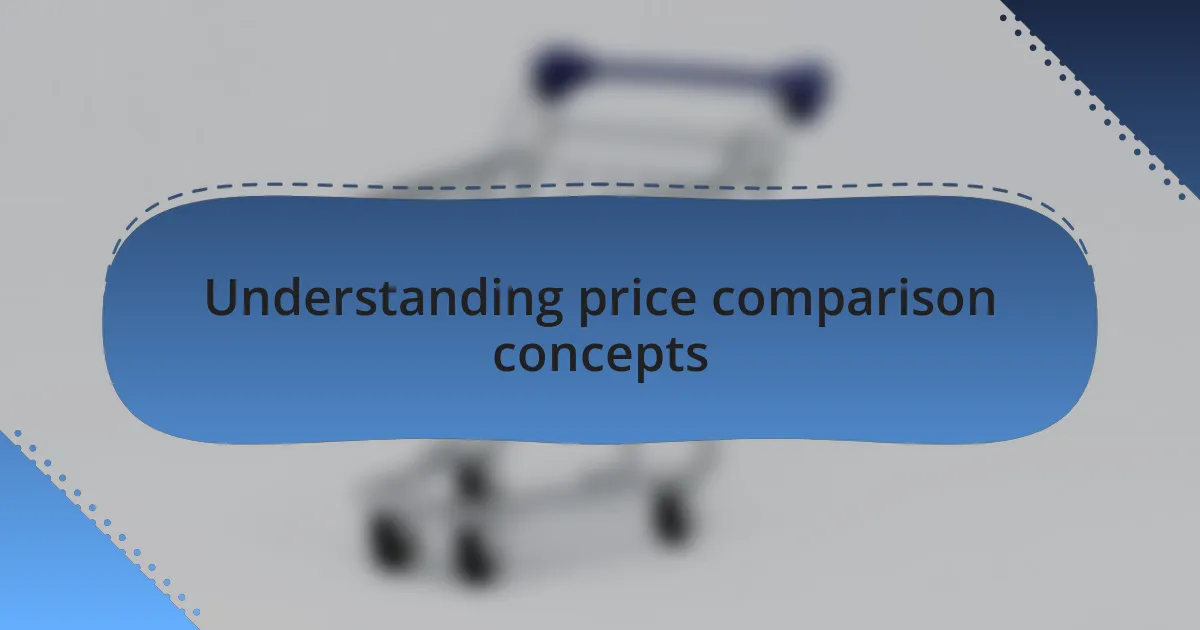
Understanding price comparison concepts
When I first started shopping around for the best deals, I realized that understanding price comparisons was essential. It’s not just about finding the lowest price; it’s about knowing the value you’re getting in return. Have you ever bought a cheaper product only to find it’s subpar? That’s a classic pitfall of ignoring quality for price alone.
Price comparison concepts also involve the idea of transparency in pricing. I remember a time I compared two similar electronic devices online, one listed at a tempting discount but with hidden fees for shipping. That experience taught me the importance of digging deeper into what each price truly encompasses. Have you ever been surprised by extra costs that just didn’t add up?
Finally, it’s essential to appreciate the context of price fluctuations. There’s a thrill in spotting a deal that seems too good to be true, but often, it’s the understanding of market trends that truly guides us. I’ve noticed that timing can significantly impact prices, especially during sales events. It makes me wonder, do we really know when the right time to buy is? Sometimes, it’s worth waiting a little longer for the right opportunity.
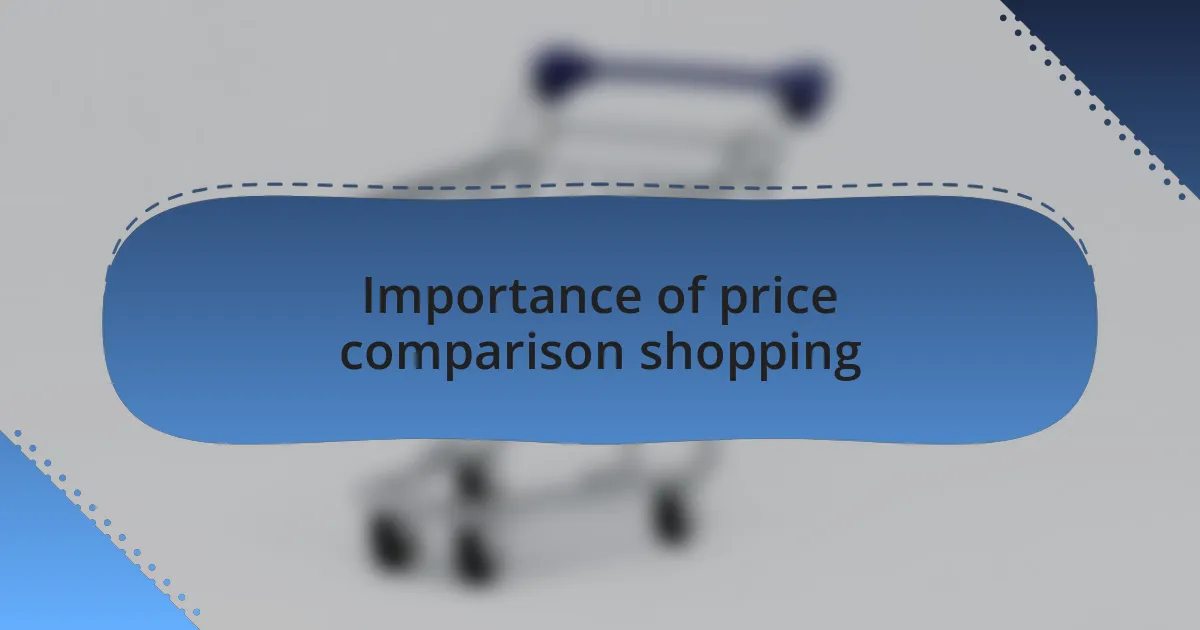
Importance of price comparison shopping
Price comparison shopping is crucial because it empowers consumers to make informed decisions. I recall hunting for a great deal on a kitchen appliance last Black Friday. After comparing prices across several retailers, I found the same item at a significantly lower price elsewhere. The sense of satisfaction was immense, knowing I didn’t just save money but also made a wise investment.
Additionally, engaging in price comparison helps unravel offers that might first appear enticing but are misleading. I once encountered a promotion that claimed I would save 40% off a popular gadget. However, after some comparison, I discovered that equivalent products were selling for even less. It’s moments like these that raise the question: how often do we let ourselves be swayed by marketing tactics rather than clear, factual pricing?
Ultimately, the importance of price comparison shopping extends beyond immediate savings. It builds confidence in my purchasing choices, allowing me to feel like a savvy shopper. I remember a time I took the plunge on a higher-priced item because my research showed it offered better longevity. That purchase not only performed exceptionally well but also reinforced my belief that investing time in price comparison can lead to substantial long-term benefits.
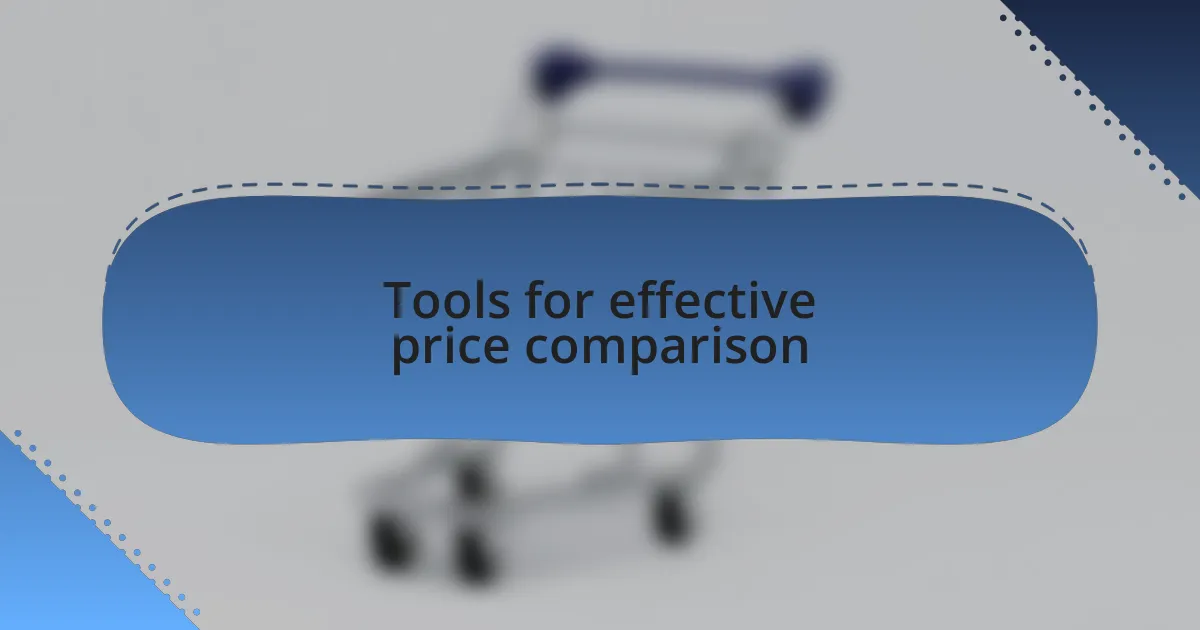
Tools for effective price comparison
When it comes to effective price comparison, having the right tools can make all the difference. I often rely on price comparison websites that aggregate deals from various retailers. One memorable Black Friday, I used a specific app to track a coveted gaming console; the tool not only alerted me to price drops but also indicated stock levels at nearby stores. It felt like I had a personal shopping assistant ensuring I wouldn’t miss out on a hard-to-find item.
Mobile apps have also become vital in my arsenal. They allow for real-time comparisons while I’m in-store, saving me from impulse buys. I remember standing in an electronics shop, holding a high-priced TV, and quickly checking my go-to app. To my surprise, the same model was available online for several hundred dollars less. That moment solidified my belief that having tools at my fingertips empowers me to make smarter purchases.
Don’t underestimate the value of browser extensions, either. These handy tools can alert you to price drops, and they often provide historical pricing data. There was a time I wanted a new laptop, and a browser extension showed me it was at its lowest price in months. As I pondered the purchase, I felt a mix of thrill and assurance knowing I’d made an informed decision, rather than just chasing the latest trend. Isn’t it fulfilling to make purchases backed by data and personal insight?
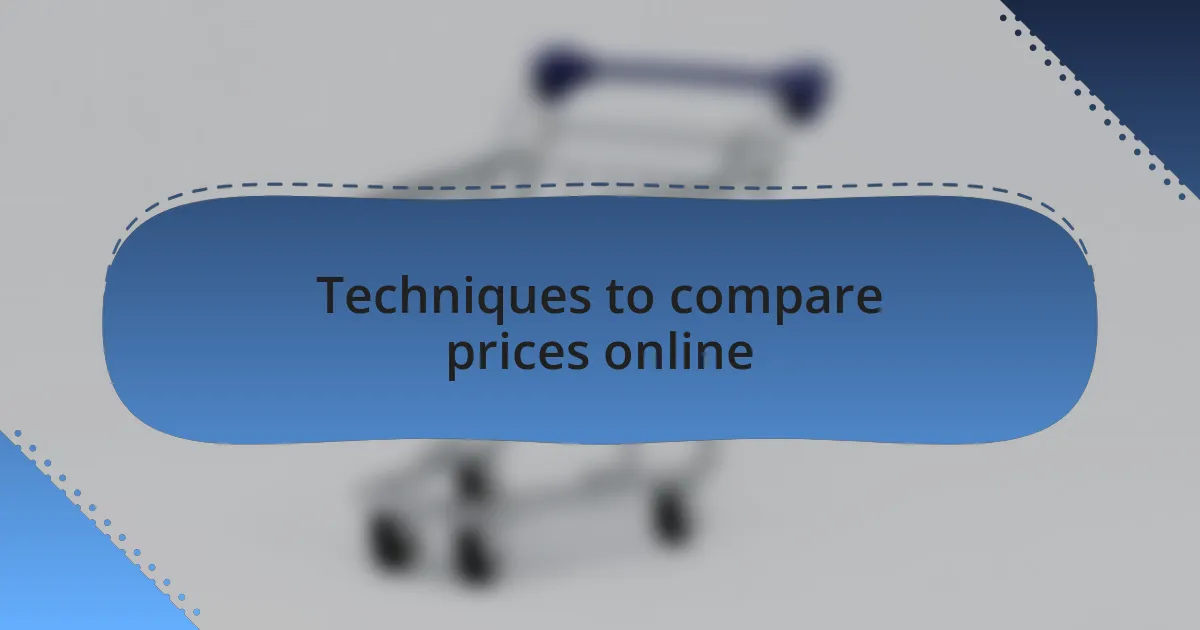
Techniques to compare prices online
When comparing prices online, I often take advantage of multiple tabs. This technique allows me to view several retailers at once, making it easy to spot discrepancies. I remember one Black Friday where I had six tabs open, evaluating the same laptop. It was a bit chaotic, but the rush of finding the best deal made the effort worthwhile.
Another effective strategy is using price tracking websites. These platforms not only show you the current price but also provide a history of price changes. I used one to monitor a pair of headphones, and when the price plummeted, I could feel my heart race. It felt exhilarating to pounce on the deal, knowing I’d saved significantly compared to earlier prices.
Lastly, subscribing to newsletters from your favorite retailers can yield significant savings. Occasionally, I receive exclusive discount codes that aren’t advertised elsewhere. Just last year, I snagged a great deal on a smartwatch because I had subscribed to alerts. It’s amazing how staying in the loop can lead to unexpected treasures, isn’t it?
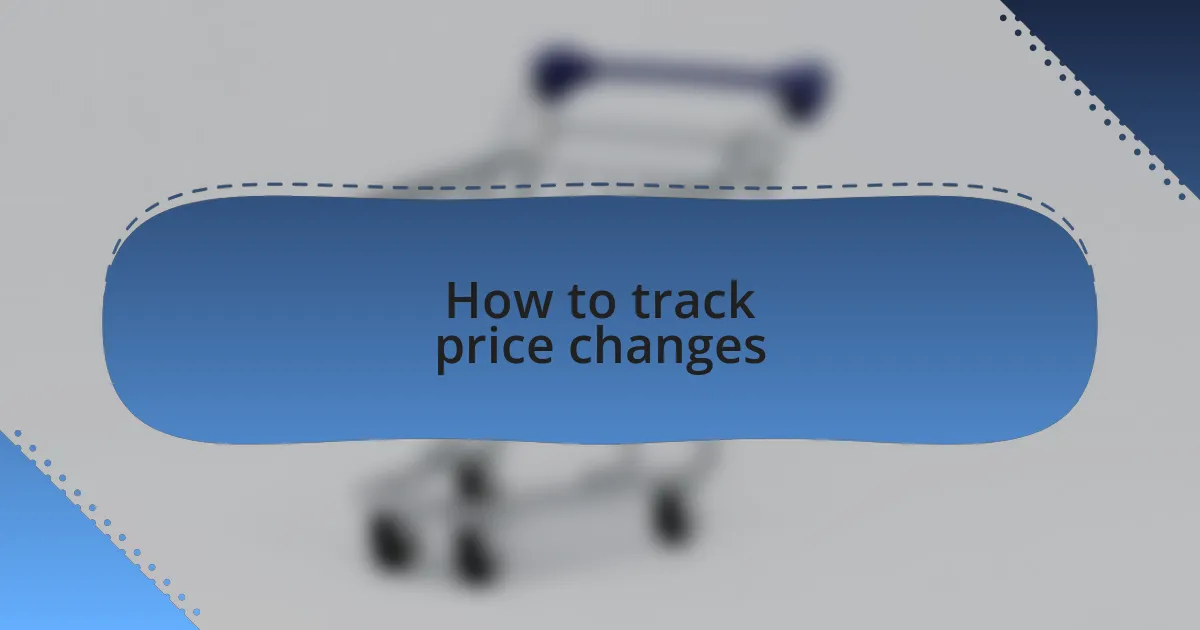
How to track price changes
To effectively track price changes, I often use browser extensions designed for this purpose. These handy tools alert me when prices drop or rise, allowing me to make informed decisions without constantly monitoring the site myself. Just last year, I received an alert on a kitchen gadget I had my eye on for months, and when it finally went on sale, I felt a wave of excitement wash over me.
Another method I rely on is setting up alerts directly on retailers’ websites. By entering my email for notifications, I ensure that I’m among the first to know about price adjustments. There’s something satisfying about seeing that email pop up when a product I want is discounted—it’s almost like a mini-celebration!
Additionally, I tend to keep a close eye on social media platforms for flash sales or exclusive promotions. Often, retailers announce temporary deals that don’t get widely publicized. It’s fascinating how a quick scroll through my feed can lead to discovering unique offers. Have you ever felt that thrill of snagging a last-minute deal? It reinforces my belief that staying engaged across multiple channels pays off during the shopping frenzy!
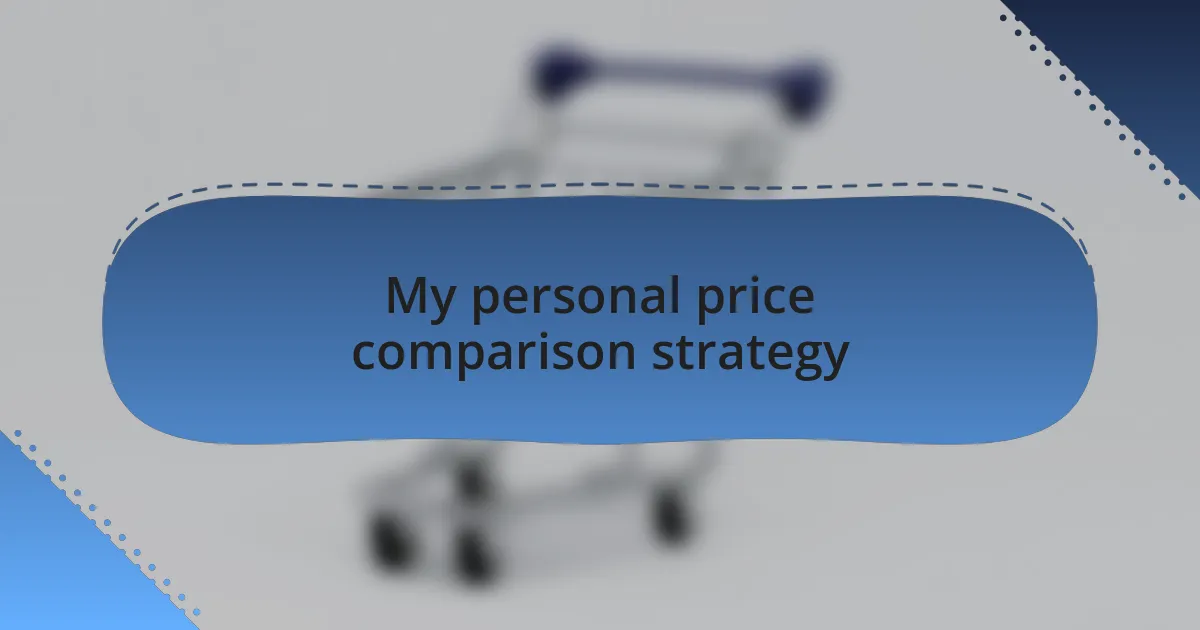
My personal price comparison strategy
When it comes to my price comparison strategy, I start by creating a detailed wishlist. I list the items I want along with their current prices. This process is surprisingly satisfying; it not only helps me organize my thoughts but also marks my progress as I begin to identify patterns in pricing across different retailers. Do you ever notice how certain products fluctuate in price? Keeping track of these changes gives me a sense of control and helps me decide the best time to make a purchase.
I also make it a habit to leverage various price comparison websites. These platforms allow me to quickly gauge where I can find the best deals. I remember once finding a popular smart TV for nearly $200 less on one site compared to another. It was a great reminder that spending a few extra minutes comparing prices can lead to significant savings. Have you ever experienced that rush of finding the perfect deal? It’s moments like those that keep me motivated to keep refining my strategy.
Another aspect of my approach involves following specific brands and retailers on their newsletters and social media. One holiday season, I happened to see a social media post with a limited-time offer just as I was about to buy an item at full price elsewhere. That urgency is thrilling—it pushes me to act quickly, reinforcing the idea that being alert to promotional announcements can lead to unexpected savings. Each time I score a deal this way, it feels like a personal victory. How do you stay informed about the latest deals?